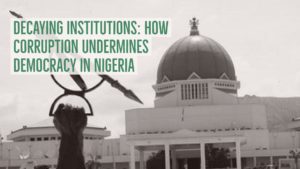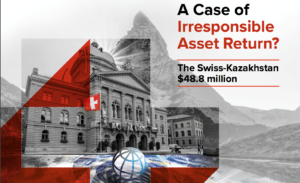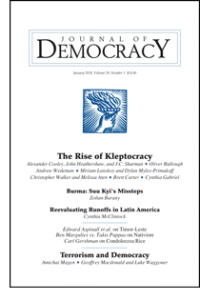 The two main candidates vying to lead Africa’s most populous nation after elections this weekend offer very different choices for reforming this vital industry, between public or private sector-led development. It highlights a continuing debate in the country for which the term “kleptocracy” was coined in the 1960s over whether corruption is the price Nigeria must pay for growth, the FT’s Big Read observes.
The two main candidates vying to lead Africa’s most populous nation after elections this weekend offer very different choices for reforming this vital industry, between public or private sector-led development. It highlights a continuing debate in the country for which the term “kleptocracy” was coined in the 1960s over whether corruption is the price Nigeria must pay for growth, the FT’s Big Read observes.
Academic research suggests that the problem goes far beyond a small number of “tax haven” countries, notes Crooked Timber of Humanity. Alex Cooley and Jason Sharman, for example, have carried out extensive research on kleptocratic corruption. They find that the standard picture of a world where there are relatively honest rich countries, and relatively corrupt poor ones, is quite wrong. Corruption and tax evasion is not a problem of bad countries but transnational networks, it adds:
 Different jurisdictions are connected together by the channels of (1) banks, (2) shell companies, (3) foreign real estate, and (4) second citizenship and investor visa programs. Notably, much corrupt activity is conducted by and through respectable banks, lawyers and accountants….Other scholars are trying to estimate how much money is hidden from authorities. Gabriel Zucman at the University of California in Berkeley has estimated that approximately 8% of global wealth, or US$7.6 trillion, is hidden in offshore arrangements, designed to either avoid or evade taxes.
Different jurisdictions are connected together by the channels of (1) banks, (2) shell companies, (3) foreign real estate, and (4) second citizenship and investor visa programs. Notably, much corrupt activity is conducted by and through respectable banks, lawyers and accountants….Other scholars are trying to estimate how much money is hidden from authorities. Gabriel Zucman at the University of California in Berkeley has estimated that approximately 8% of global wealth, or US$7.6 trillion, is hidden in offshore arrangements, designed to either avoid or evade taxes.
 These networks have stark implications for democracy in developing countries. As Branko Milanovic argues:
These networks have stark implications for democracy in developing countries. As Branko Milanovic argues:
[The traditional] view that robber barons may demand the rule of law and the protection of property rights once they have acquired property seems reasonable—so long as we assume that there is no globalization. But with globalization, it is not necessary to fight for the rule of law in one’s own country. … A much easier course of action is to take all the money and run away to London or New York, where the rule of law already exists and where nobody will ask where the money came from. A number of plutocrats from Russia, and increasingly from China, are taking this route. RTWT
 CORRUPTION & KLEPTOCRACY: THE SCOURGE OF EASTERN EUROPE
CORRUPTION & KLEPTOCRACY: THE SCOURGE OF EASTERN EUROPE
Western “enablement” of corruption and kleptocracy in Eastern Europe has been said to frustrate democratic political development in Eastern Europe. Please join us for a panel discussion with Eastern European experts Charles Davidson, publisher of The American Interest magazine; Nino Evgenidze, Executive Director at the Economic Policy Research Center in Tbilisi, Georgia; Daria Kaleniuk, co-founder of the Anti-corruption Action Centre, Ukraine; and Miranda Patrucic, an investigative reporter based in Sarajevo. Professor Jenik Radon will moderate. RSVP
Monday, March 11, 2019 6:15pm – 8:00pm. Marshall D. Shulman Seminar Room, 1219 International Affairs Building (420 W 118th St), New York







